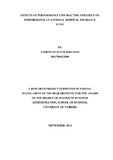| dc.description.abstract | Performance Contracting has now become an acceptable strategy for planning and measuring performance in the Kenya public sector. A performance contract like any other contract is a lawfully contract entered into by different parties who agree on the terms and execution of the contract. The use of Performance Contracting strategy in Kenya stems from best practices around the world to ensure efficiency and transparency in public institutions. In the case of performance contracts in Kenya, they are entered into by the government as the manager in favour of the public and ministries or departments or state corporations as the executors of the contracts. Performance contracting in many countriesis said to improve performance of organizations. In addition to improving performance, as a strategy it assists in planning for results. The Performance Contracting pre-requisites for organisations are institutional strategic plan, approved budgets and approved procurement plans. This implies that Performance Contracting strategy is a continuous cycle which begins way before the contract is signed by accounting officers in government institutions. This study shall focus on the effect of Performance Contracting strategy on performance at the National Hospital Insurance Fund. There have been many researches on Performance Contracting strategy; however, none has been carried out on its effect in the Kenya health sector and in particular the National Hospital Insurance Fund. This research is a case study which focused on the effect of Performance Contracting strategy on performance at the National Hospital Insurance Fund. The areas that have been discussed are effectiveness, efficiency, relevance and financial viability as measures of performance. The targeted respondents were the senior management, who by and large are responsible for developing the organizational performance contract, negotiation and ensuring its execution. The researcher used an interview guide to collect views, opinions, perceptions, feelings and attitudes from the respondents regarding the effect of Performance Contracting on performance at the National Hospital Insurance Fund. In addition the researcher used secondary data that was provided during the discussions. The findings have been presented using content analysis, tables and charts. Indeed Performance Contracting has an effect on institutional performance as shown in the study. There are a few challenges the organization may need to address which are linking performance and rewards to improve efficiency of individual employee performance to realise the cascaded targets. This study recommends that the Ministry of Planning and Devolution charged with developing framework for Performance Contracting works out rationale to analyse the relationship between resources utilised and results achieved rather than carrying out independent analysis | en_US |

